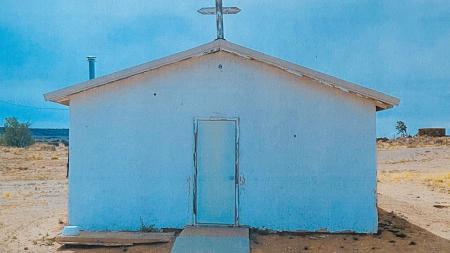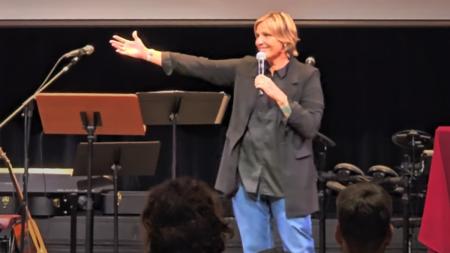‘Staying on the Wall’: Black and Reformed Leaders Renew Their Calling

Laura Carpenter Pitchard
Black clergy and ministry leaders from the Christian Reformed Church in North America gathered recently for prayer and praise and to support and encourage each other with new leadership direction as they face obstacles and challenges that can get in the way of doing the work God has called them to do.
The event began with each participant sharing their name, city, state, and calling. “Our ‘calling’ is more important than our ‘title,’” said Rev. Denise Posie, the event host and the director of the CRC’s new Office of Leadership Development: Women’s and Ethnic Ministry.
The focus of the gathering was on Nehemiah 6: 1-16, in which Nehemiah leaves his position with Artaxerxes, king of Persia, and faces challenges as he answers the call of God. “Nehemiah,” she said, “was a cupbearer, and yet God called him to go and build the walls of Jerusalem.”
At the event, Posie added, participants went deeper than ever before into small group conversations about how they came into the CRC and what they see as their greatest joy.
Throughout their time together, the clergy and ministry leaders focused intently on the theme of this year’s three-day Black and Reformed conference, titled “Stay on the Wall! Reclaiming, Renewing, Re-imagining” and based on Nehemiah 6:1-16.
In those verses, Nehemiah keeps getting interrupted in the work of rebuilding the wall around Jerusalem, as he receives messages sent by his enemies who don’t want the wall to go up.
“Nehemiah is a book of little miracles,” said Rev. Reggie Smith, director of the offices of Race Relations and Social Justice. “Nehemiah is called back to Jerusalem, where the walls have been broken down and the people are saying, ‘What are we going to do?’”
At the conference, the clergy and other leaders, facing their own struggles as a minority group in the CRCNA, and at the same time needing to address the everyday challenges of ministry, were asked to consider how were they going to build walls of certainty and faith that will help keep them strong.
“Nehemiah is asked to do something, but he has no idea how to do it,” said Smith. God put the plan in Nehemiah’s heart, and the people were willing to follow his plan.
As was the case with Nehemiah, said Smith, “God is nudging us to have a new imagination because he has new work for us to do. We might need new skills. Maybe we need a new vision for what the Lord wants us to do.”
Sponsored by the CRCNA Black and Reformed Leadership Network, the conference ran from Thursday, Sept. 27, through Saturday, Sept. 29.
Thursday was set aside solely for pastors and clergy members of the leadership network. Then on Friday, in sessions open to all participants, several pastors, clergy, and other leaders focused on Nehemiah 6:9, where Nehemiah says, “They were all trying to frighten us, thinking, ‘Their hands will get too weak for the work, and it will not be completed.’ But I prayed, ‘Now strengthen my hands.’”
The leaders spoke intently about “staying on the wall” and holding fast in a denomination that was once unfamiliar to many of them and can still be difficult to navigate. On Saturday, the event wrapped up with worship, prayer, and imagining a path forward.
Our History and Journey in the CRC
Rev. Emmett Harrison, pastor of Oakdale Park CRC in Grand Rapids, Mich, was born in Mississippi and grew up in Chicago, where he worked with several organizations working for justice.
“When I began to realize that justice is also high on God’s agenda, I cried out to God to help me,” he said, adding that he was eventually led through a series of circumstances to meet and start working with Rev. Tony Van Zanten, pastor at Roseland Christian Ministries in Chicago.
Van Zanten taught him about and helped him connect with the Christian Reformed Church, in which he was eventually ordained.
At the conference, Harrison mentioned influential, visionary black pastors such as Rev. Eugene Callender, who led a church in Harlem in the 1950s, pioneering the way for black clergy into the CRC, and Rev. Dante Venegas, who moved from Harlem to Grand Rapids to copastor Madison Square CRC. Venegas was a father, pastor, and friend to so many new pastors, he said.
“Today,” said Harrison, “we are standing on the shoulders of others who came before us. We need to stay on the wall. Things can be tough, but God has placed us here for this time and place to open doors so that people can come in and experience the fullness of God’s grace.”
Being Black and Reformed
Being black in the CRC can be hard, especially when it comes to worship, said Dr. Eric Washington, who teaches African and diaspora studies at Calvin College.
“We are an Afrocentric church. It is not always easy to be in a white space, but we also know that God has a big enough tent for everyone,” he said.
“We have a history that matters. . . . We wrote spirituals that came right from our marrow.”
Most black people have come to the CRCNA because God has called them to be there, not because it is their background, added Rev. Dr. Michelle Loyd-Paige, executive associate to the president for diversity and inclusion at Calvin College.
In coming to the CRCNA, it is crucial, she said, “to remember that we bring that to our theological understanding and our worshiping experience.”
Nehemiah Pointed the Way to Christ
Nehemiah was serving as the cupbearer for the king, meaning he was trusted to test the king’s wine for poison, when he learned that the wall around Jerusalem and its gates had been destroyed, said Rev. John Mondi, pastor of the African Community Fellowship in Grand Rapids.
When Nehemiah heard what had happened and then heard God’s voice calling him to go and rebuild the wall, he listened and went. Nehemiah took on the task. In doing that, he pointed toward the mission of Jesus, who came to rebuild the lives of people of all nations and usher in a new kingdom.
“Nehemiah was pointing to Jesus Christ, whom God sent to bring us back to him,” said Mondi. “This is revival, restoration; it is going back to the drawing board and starting over.”
Despite the hardships, Nehemiah inspired the people to keep going, building the wall brick by brick. They faced trouble, but they pushed on.
“Don’t quit; don’t turn away,” said Mondi. “It can be very brutal, but stay on the wall with faith and hope in Jesus Christ.”
Don’t Confuse the Wall with God
It is important, however, to keep in mind that the things we do can become our passion, our purpose in life, our obsession. Similarly, building and staying on the wall can lead us astray, said Rev. William Karshima, pastor of Oasis Church in Winter Garden, Fla.
“We have to regard Jesus as our hope and trust, not the wall. The wall is important, but it is not the primary thing,” he said. “Remember that when Nehemiah wept, he was not weeping over the wall but over the condition of the city and the people.”
Stand Firm and Help Our Communities
Just as Nehemiah went to rebuild the wall, Rev. Glen McCarthy became the founding pastor of Reconciliation Church (formerly Peace CRC) in South Holland, Ill.
With the neighborhood around the church becoming increasingly black, the church council saw him as someone who could help bring new life back to the church by reaching people in the community.
In working to bring new life to the church, McCarthy was reminded that he needed to be authentic and pay attention to his past. He needed to remember who he was and is. Though a member of the CRCNA, he needed to accept his heritage and base his ministry on that.
“Nehemiah leaned on what he knew worked,” McCarthy said. “Sometimes we forget what brought our grandparents through. Nehemiah remembered he was a Jew and these were his people.”
McCarthy said he has needed to remember the circumstances of his youth. His family had no health care and sometimes little food. That reminds him to look around him in the city to see people who are facing similar challenges today.
“We pray day and night for the children of Chicago,” he said. “We need leaders like Nehemiah, who knew the word and the ways of God. We need leaders who understand what is going wrong in our communities.
“Stay on the wall and build. God is calling us to build, but also to engage in spiritual warfare. There are strongholds we are called to break down so that our children’s lives can be better than ours.”
Posie noted she was encouraged by the comments made by participants about their experiences as the Black and Reformed Leadership Network imagines a new path forward. Here are a few of them:
- "It was reassuring to hear Dr. Danjuma Gibson [a professor at Calvin Theological Seminary] tell brief stories about four black women who demonstrated genius, strength, and courage in making significant contributions in seeking justice for others ."
- "God is calling us again to reclaim, renew, and re-imagine our identity in Christ — as we remain faithful agents of the good news!"
- "We are to persevere through whatever comes into our life because God is always working through us."
- "We need each other as God uses us to build his kingdom."


